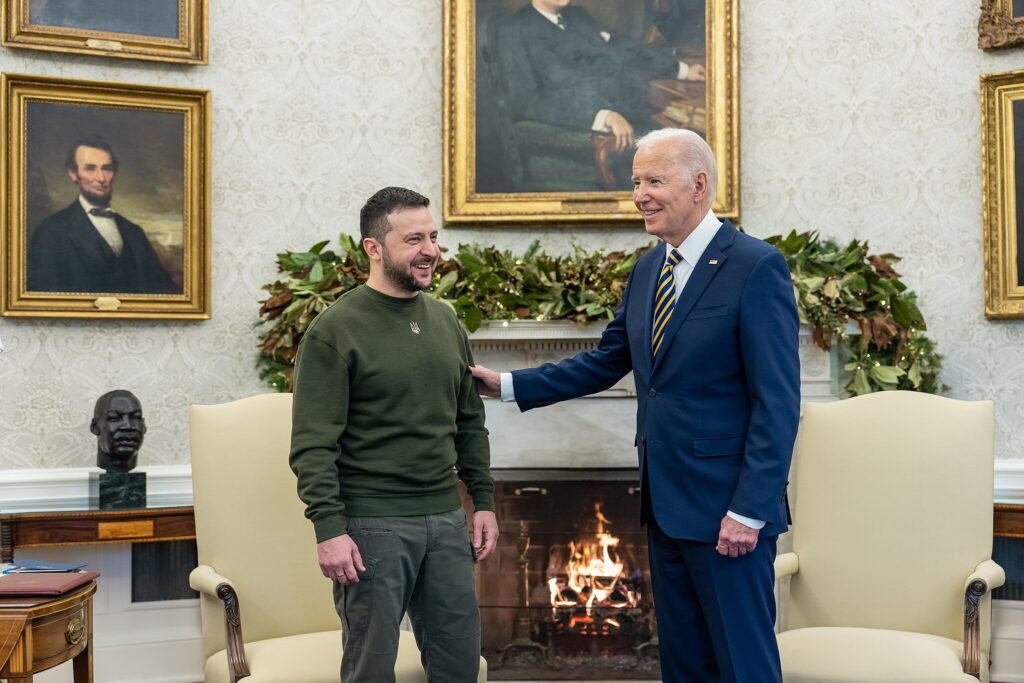On 31 May 2024, President Joe Biden gave Ukraine the go-ahead to use American-supplied weapons to strike targets across the border with Russia in the Kharkiv region, a move quickly followed by the German government. This policy change came amidst increased Ukrainian and allied pressure to loosen restrictions on Western-supplied weapons in the face of a renewed Russian offensive. However, fears of escalation and a wider conflict have been stoked across the region, with President Vladimir Putin warning of serious consequences should Western weapons be used on Russian soil.

Neutralising the Russian advantage
Russia’s battlefield gains, particularly in the Kharkiv region, constitute a worrying development for US officials, as Ukrainian troops are already overextended. Previous weapon restrictions prevented Ukraine from using Western-supplied weapons to strike Russian forces amassing across its border to support the offensive. With loosened restrictions in place, Ukraine has already sought to neutralise the Russian advantage by using the American HIMARS long-range rocket system to strike a missile system in the Russian region of Belgorod.
The policy reversal came on the heels of the US Congress passing a long-delayed aid package for Ukraine. The delay in aid, along with other factors, engendered ammunition shortages in Ukraine. President Biden’s recent public apology to Ukraine’s President Zelensky highlights the delay’s impact on Ukraine’s war effort. The US has also lifted the ban on American weapons and training for Ukraine’s infamous Azov Brigade after its vetting process cleared the fighting unit of allegations of human rights violations, in what could be a bid to revitalise Ukrainian fighting capacity.

The loosened restrictions are aimed at significantly helping Ukraine’s war effort, especially in pushing back the renewed Russian offensive. Artillery weapons such as the M777 Howitzer and PHZ 2000 are capable of hitting across certain sections of the Russian border from Kharkiv, while rocket launch systems such as MARS II/MLRS and HIMARS can reach the city of Belgorod, a major staging point for the Russian offensive. It is well reported that F-16 jets and Storm Shadow missiles can reach targets deep into Russian territory.
However, the loosened weapon restrictions do not constitute a carte blanche for Ukraine. The United States has allowed the use of its weapons near the Kharkiv region and has prohibited the use of its long-range Army Tactical Missile System (ATACMS) to strike targets in Russia. Another restriction that has been levied on the use of American weapons is that they must be used to only hit military targets that have been used for the Russian invasion of Ukraine. President Biden further clarified that US weapons would not be used to strike deep inside Russia or to target Moscow. Other allies have too imposed their own conditions. Germany has withheld its long-range Taurus missiles, and the Danish Foreign Minister had cautioned against the use of Danish-supplied F-16s to carry out arbitrary strikes on Russian territory.
Political Support
Support for striking targets inside Russia had been building for some time. On 3 May, the UK Foreign Secretary made news by stating that Ukraine could use British-supplied weapons, including the long-range Storm Shadow missiles, to strike back at Russia within its territory. Other European countries, such as the Baltics, Finland, and Sweden have had no problem with Ukraine using their weapons to conduct cross-border strikes. NATO Secretary-General Jens Stoltenberg highlighted at the recent NATO parliamentary assembly in Bulgaria that weapon restrictions have had an incapacitating effect on Ukraine.
France’s President Macron was the most outspoken among European leaders, stating that a potential Russian victory would bring about a loss of security for the entire European continent. Furthermore, he refused to place any limits on French support to Ukraine, including the possibility of sending troops to Ukraine. France is reportedly close to finalising preparations along with a coalition of countries, to send military trainers to Ukraine.

Ukraine however does not enjoy unanimous political support within Europe. Italy has firmly rejected its weapons being used to strike Russian territory. Belgium, which is preparing to send 30 F-16 jets to Ukraine, has stated that Ukraine must avoid flying them over Russia. Hungarian Prime Minister Viktor Orbán, long perceived as one of Russia’s staunchest supporters within Europe, criticised the use of Western-supplied weapons within Russia as an escalation that could transform the war in Ukraine into a global conflict. Hungary also criticised the use of Western-supplied weapons within Russia as an escalation that could transform the war in Ukraine into a global conflict.
Russian Response
Russia has accused NATO and European countries of escalating and prolonging the conflict. President Putin warned against the use of Western-supplied weapons, especially advanced missile systems, within Russia, asserting that such a step would be tantamount to Western involvement in the war. He reasoned that Ukrainian strikes within Russian territory would not be possible without Western intelligence and military support. He further threatened that Russia could reciprocate by providing its long-range weapons to others to hit Western targets.
President Putin also resorted to nuclear sabre-rattling, warning that Western countries would be mistaken in assuming that Russia would never use nuclear weapons. Russia conducted tactical nuclear drills in May near Ukraine in response to French and British comments hinting at greater involvement in the conflict.
Implications for the ongoing conflict and beyond
With Western-supplied weapons already having been used on Russian soil, a Russian response remains to be seen. Western countries have mostly favoured the use of their weapons on Russian territory, seemingly dismissing Russian threats. With French military trainers seemingly set to arrive in Ukraine, Russia has averred that they would be legitimate military targets. While it is impossible to predict whether Russia would carry out its threat, a strike on French or NATO troops in Ukraine would constitute a marked escalation in the conflict.
Implications for Governments
- The loosened restrictions and the possibility of greater involvement in the war in Ukraine could lead to significant escalation. If allied military trainers arrive in Ukraine, there is a possibility that they could be hit as part of Russian attacks. This could bring Russia and Ukraine’s allies including NATO and EU countries into a direct confrontation and spark a regional war or escalate into a much broader conflict.
- Questions have been raised about the legal implications of weapon transfers to Ukraine. With some of these now being used on Russian soil, Ukraine’s allies might need to take caution to avoid violating their neutrality under international law.
- Ukraine’s allies need to consider the possibility of war crimes being committed with their weapons. They need to increase their monitoring and reporting capabilities to ensure their weapons are used in compliance with international and humanitarian law.
- Small states such as the Baltics need to be particularly cautious with regard to an escalation with Russia. The leaders of the Baltics have been among the most publicly supportive of Ukraine conducting strikes in Russia, and President Putin has directly threatened such “small” countries.
- Nuclear Consequences: The use of Western-supplied weapons within Russia could lead to a nuclear response from Russia, which would have catastrophic consequences for the region and the world.
- Risk of Retaliation: Russia may retaliate against NATO countries or their allies, posing a risk to their national security and economic interests.
- Global Consequences: The conflict could have significant global implications, including potential disruptions to global supply chains, economic instability, and increased tensions between major world powers
Implications for Private Firms
- Increased Demand: There may be an increase in the demand for Western-supplied weapons now cleared for use in Ukraine.
- Manufacturers might also face increased scrutiny with regard to the end use of their products – requiring greater efforts to ensure compliance with international law.
- Ukrainian arms industries could also see an increased demand for their products thanks to the US aid package.
- Ethical Considerations: Arms manufacturers will need to consider the ethical implications of their products being used in a conflict, ensuring that they are not contributing to human rights violations or war crimes.
- Regulatory Compliance: Manufacturers will need to ensure compliance with international regulations and treaties, such as the Arms Trade Treaty, to prevent the misuse of their weapons and avoid legal consequences.
- Risk to Western Businesses: Western businesses operating in Russia or with Russian interests could face significant risks, including potential sanctions, asset freezes, or even expropriation.

